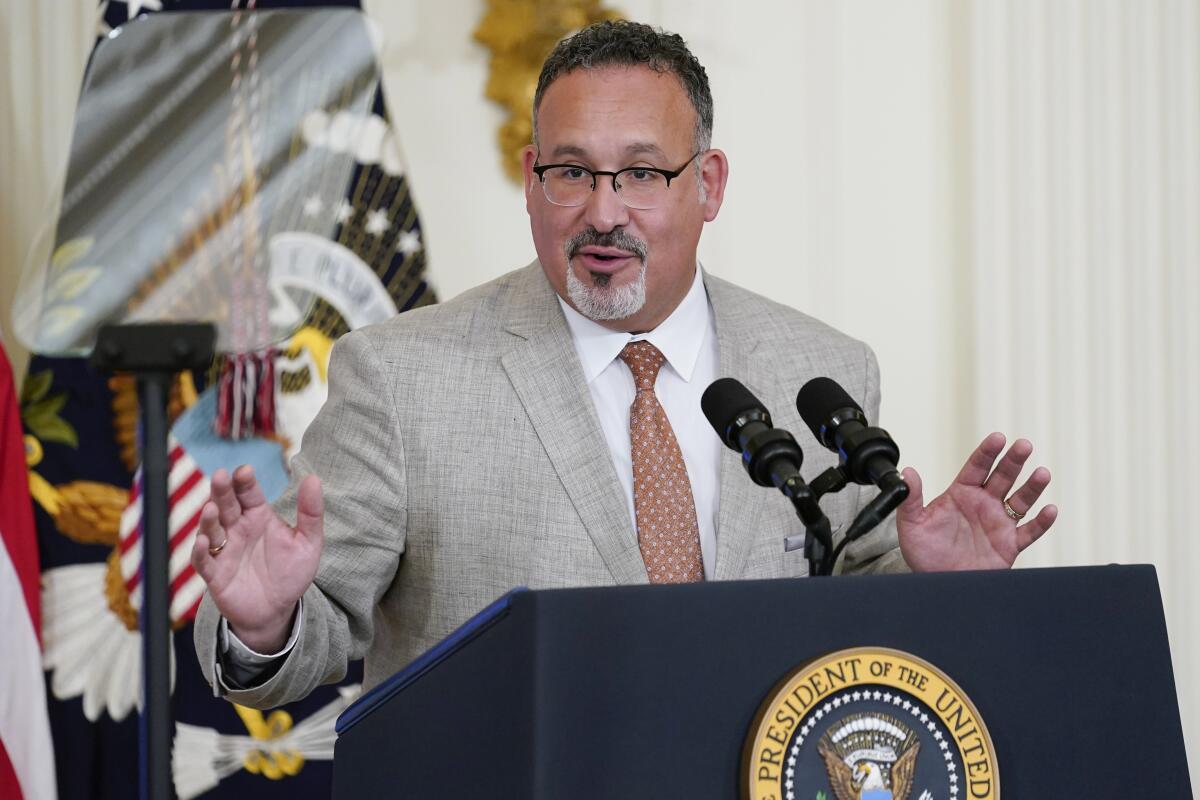Biden administration moves to expand Title IX protections. Here’s what California says

- Share via
New Title IX proposals by the Biden administration to affirm sexual discrimination protections for transgender students and others would not significantly change existing policies at California universities and colleges, said officials who were assessing Thursday the potential impact on the state.
California campuses already bar discrimination based on gender identity and sexual orientation. And some of the proposed changes to the Title IX sexual misconduct review processes are already in place in California under a 2019 state appellate court ruling, regardless of federal regulatory revisions.
“It’s unclear whether this will really be a sea change,” said Kiersten Boyce, UC Riverside associate vice chancellor and interim Title IX officer.
The Biden administration unveiled the proposed changes Thursday, the 50th anniversary of Title IX — the landmark federal law that bars sex discrimination in educational programs or activities that receive federal funding. They are intended in part to reverse some controversial rules issued during the Trump administration by Education Secretary Betsy DeVos and come amid a conservative push to bar transgender athletes from sports and restrict bathroom use to a person’s sex assigned at birth.
The proposed revisions clarify that the Title IX ban on sex discrimination extends to sexual orientation and gender identity. That guidance was announced by the Obama administration in 2016, then rescinded by the Trump team, which left the matter to the states. The Biden administration first declared it would return to the Obama guidance last year, after the U.S. Supreme Court ruled that federal bans on bias based on “sex” must also include sexual orientation and gender identity.
The most heated issue — how to address student eligibility to participate on male or female athletics teams — was not included in the Title IX proposal released Thursday. The U.S. Department of Education said it would issue a separate proposal in the future.
The University of California, California State University and other public colleges and schools never removed protections for transgender students during the Trump administration. UC’s nondiscrimination statement, for instance, bars bias on the basis of “race, color, national origin, religion, sex, gender identity, pregnancy, disability, age, medical condition (cancer-related), ancestry, marital status, citizenship, sexual orientation, or status as a Vietnam-era veteran or special disabled veteran.”
“UC has remained steadfast in its commitment to equitable and inclusive treatment for all members of our community, including transgender and nonbinary individuals, despite positions taken by the previous administration,” UC said in a statement.
UC also found ways to address sexual misconduct complaints that did not meet the Trump administration’s stricter Title IX rules. Under DeVos, sexual harassment had to be both “severe and pervasive” to qualify for Title IX protection, rather than one or the other, as previous federal rules allowed. UC handled complaints that fell short of the higher bar through alternative processes based on violations of other campus policies, such as student or faculty codes of conduct, Boyce said.
“The new regulations proposed by the Biden administration would not affect the current state of the law in California, which requires due process in student disciplinary matters,” said Mark Hathaway, a Los Angeles attorney who has represented more than 200 students and faculty in misconduct cases, most involving sexual misconduct.
While current Title IX policies at CSU’s 23 campuses and California’s 116 community colleges also protect transgender students, both systems are reviewing the proposal for any possible effect on other regulations.
Title IX has not been foolproof. At CSU — the largest four-year public university in the country — recent Times investigations have revealed discrepancies in how Title IX and sexual harassment cases involving faculty and students are handled. The interpretation of the law is often subjective, experts have said, and investigative procedures and timelines can vary as campuses address a growing number of cases. It’s unclear how, or if, the new proposal would better streamline practices.
Some of the Trump administration’s most sweeping changes — the right to a hearing and the ability to cross-examine — were already in use in California under a 2019 state appellate court ruling. The court ordered campuses to enact those due process protections for students accused of sexual misconduct as a matter of “fundamental fairness.” The court also said the same person who investigates the complaints cannot also determine if they are credible — a “single-investigator model” used by UC and other campuses at the time — since that improperly “places in one individual the overlapping and inconsistent roles of investigator, prosecutor, fact-finder, and sentencer.”
Biden’s proposed regulations would not require cross-examination, although a university could allow it if desired. Nor would they require a live hearing for evaluating evidence or different people to investigate a complaint and determine its credibility. But those practices, ordered by the appellate court, are expected to remain at California campuses, college officials said.
UC Riverside’s Boyce said she was still assessing the 701-page Title IX proposal. She said she was excited to see whether it offers new tools to combat sexual assault, better protect transgender students, address retaliation against those who file complaints and support pregnant students and employees.
President Biden’s education secretary, Miguel Cardona, said Title IX has been “instrumental” in fighting sexual assault and violence in education.
“As we celebrate the 50th anniversary of this landmark law, our proposed changes will allow us to continue that progress and ensure all our nation’s students — no matter where they live, who they are, or whom they love — can learn, grow and thrive in school,” he said.
More to Read
Get the L.A. Times Politics newsletter
Deeply reported insights into legislation, politics and policy from Sacramento, Washington and beyond. In your inbox twice per week.
You may occasionally receive promotional content from the Los Angeles Times.










